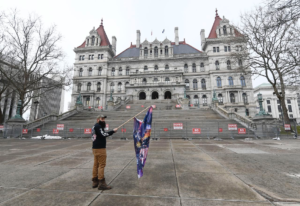“The World Has Gone Bonkers!”
I was in Albany recently for a family wedding.
I’d never been to Albany before. It is a small city with a population of about 100,000. The city center is comprised mostly of stately 19th century buildings, a sprinkling of interesting mid-20th century buildings, and a handful of ugly edifices built in the 1970s and 1980s.
Judging strictly by its architecture, Albany is a charming, city – on par with Baltimore or Philadelphia. It’s more important than Baltimore or Philadelphia, though, since it’s the capital of New York, the second-largest state in the country.
Albany also has been one of the five most-locked-down states since the outbreak of the Coronavirus Hysteria.
Strolling through the center of the city, you can’t help but notice that the place is basically vacant. It has the ambiance of a post-Apocalyptic ghost town.
The Capitol Building, a magnificent structure of various architectural styles, is closed to the public. Wire fencing prohibits you from even getting near it. You wonder why, since there have been no attacks on this building. In fact, the closest thing to political action I saw while there was a man in a uniform standing in front of the fencing, surrounded by American flags, talking quietly about his service in Iraq to what looked to be a homeless person.

The streets are empty. Almost every office building is closed and shuttered. The two coffee shops within walking distance of our hotel are each staffed by a single person, serving only take-out. You can buy a toasted bagel and a coffee, but you can’t use their bathrooms. (“We regret that, due to the pandemic, our bathrooms are not available to our customers.”)
At least 90% of the local shops and stores are also closed, because their business has disappeared. Their business is gone because the Albany legislature is not in session. Legislators aren’t in their offices. Neither are the legions of lawyers and lobbyists and assistants that support them.
I was talking to my brother-in-law as we walked from our hotel to meet the rest of the family a few blocks away.
“This is weird.” he said.
I agreed. “It’s a city where most people are employed but few are working,” I said.
“And the rest are unemployed but receiving government support,” he said, laughing.
“It’s like the city is on an extended federally funded holiday,” I said. “And nobody is complaining, because the checks are coming in.”
We talked about other craziness going on:
* All across America, small businesses are having trouble finding employees. Yet unemployment is up. (The US currently has 7.4 million job openings and 9.8 million unemployed. The most obvious explanation: the multitrillion-dollar “COVID” bailout started by Trump and tripled by Biden.)
* Dogecoin, a cryptocurrency produced as a joke, became worth billions when Elon Musk recommended it. Then it plunged nearly 30% after Musk called it a “hustle” during his guest appearance on Saturday Night Live.
* Meanwhile, the AMA announced that they are eschewing their longstanding position of individual achievement and meritocracy in favor of a new mission that is based on critical race theory.
The wedding took place in a vineyard about 20 minutes out of town. It was generally wonderful, despite a few disturbing conversations.
One young woman told me she wants to empower women by encouraging them to start making money, like she did. And how did she make her money? She made some by working for a high-tech development business, but most by investing in cryptocurrencies. So what, exactly, is she going to be encouraging them to do?
Another guest told me that the business he’s been running at a total loss of $3 million over the last seven years has a marketable value of “at least $140 million.” I wondered how he came to that conclusion. “It’s not the business,” he explained. “It’s the brand.”
When I relayed these conversations to my brother-in-law, he shrugged. “The world has gone bonkers,” he said. “I guess we’ll just have to wait and see what happens.”


